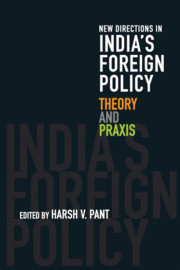1 - Introduction
Published online by Cambridge University Press: 13 November 2018
Summary
Foreign policies of nations do not alter radically with changes in governments, but with the backing of the Indian electorate's decisive mandate, the Narendra Modi government which came to office in May 2014 underlined that it was keen to bring about a realignment of Indian foreign policy priorities and goals. Ever since the end of the Cold War, the changing structural imperatives have been shaping the trajectory of Indian foreign policy. As a rising economic power, India has been gradually moving from the periphery to the centre of global politics, generating new demands on the conduct of Indian diplomacy. Yet, change in Indian foreign policy is also emanating from within: new constituencies with stakes in India's external relations have in the past quarter of a century become important to its foreign policy. Given these constellation of influences on Indian foreign policy, the agency of Narendra Modi's prime ministership adds another dimension to understanding India's external behaviour. On the one hand, Modi seems to exude an understanding of power and interests, thereby appearing ready for a realpolitik approach, while on the other, his emergence also underscores the changing identity of the Indian state itself. There is a vigorous debate in the emerging literature on whether Modi's foreign policy represents a transformation or merely an evolution in Indian foreign policy approach. Yet it is also evident that because of a range of structural and domestic political and unit level factors, new dimensions have emerged in the study and conduct of Indian foreign policy. Modi's prime ministership is just one of them.
The Modi factor
In his first few years, Modi has defied many expectations and confounded his detractors and supporters alike. On the foreign policy front, remarkably for a politician who was considered provincial before elections, Modi hit the ground running from the very first day. On the security front, there has been a new purposeful response against China with a focus on more efficient border management and defence acquisitions. Modi also reached out to the US immediately after his election, despite his personal grievances over visa denial by Washington when he was the Chief Minister of Gujarat, and there has been a focus on immediate neighbours, though not without setbacks.
- Type
- Chapter
- Information
- New Directions in India's Foreign PolicyTheory and Praxis, pp. 1 - 20Publisher: Cambridge University PressPrint publication year: 2019

